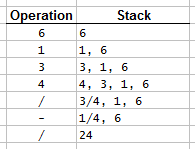Write 24 using the four numbers 1, 3, 4, 6 and basic arithmetic.
Explanations:
The given are numbers, not digits, so you can't group them using decimal notation. For example, you can't create the number 6431.
Only one occurrence of each number is allowed. For example, you can't write 24 = 6 + 6 + 6 + 6.
All numbers have to be used.
Basic arithmetic means only the 4 operations: +, -, x, /. Also parentheses (...) are allowed to set the order of operations.

